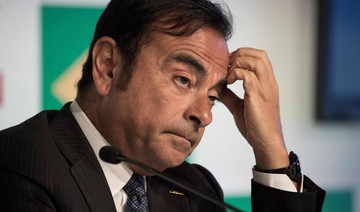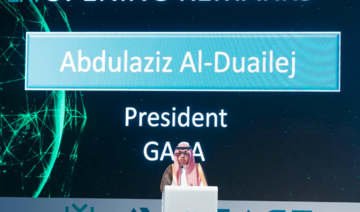PARIS: Former Renault and Nissan head Carlos Ghosn and his wife invited friends to a $260,000 Carnival party in Brazil last year and charged it to his employers, documents seen by AFP show, a move Ghosn’s lawyer defended as a routine corporate function for a multinational CEO.
News of the party is the latest evidence of Ghosn’s expensive lifestyle to emerge as his time as one of the top executives in the auto industry faces fresh scrutiny following his arrest in Tokyo last November.
According to documents seen by AFP, which confirm a report in the Express magazine, Ghosn invited eight couples to watch the Carnival parade in Rio de Janeiro in February last year from a beach-side luxury hotel.
While the guests were asked to pay their own air fare, the invitations specified that local teams would take charge of transport, lodging and other expenses.
“On behalf of Mr. and Mrs. Ghosn, I have the pleasure to inform you that they would be delighted if you would accept to be their guest at the 2018 Rio Carnival,” according to the December 2017 email invitation.
“You will be responsible to book your flight and the team will take care of you from the Rio airport,” it said, adding that the guests would be staying at the beachside Hilton Hotel in Copacabana.
The event required costly security measures including two bullet-proof vehicles which were put at the guests’ disposal.
Nissan’s Brazilian subsidiary later sent a bill of $257,872 (€227,000) to the Renault-Nissan holding company based in the Netherlands.
The Dutch firm coordinates the operations of the French-Japanese alliance, which Ghosn built into the world’s top-selling automotive group before his stunning downfall on charges of under-reporting his salary.
The 64-year-old French-Brazilian-Lebanese executive has denied any wrongdoing, but remains in detention awaiting a trial in Japan which could still be months away.
“Friendly relations do not preclude business relations, they can even help them,” Ghosn’s French lawyer Jean-Yves Le Borgne told AFP.
“We’re told it involved Carlos Ghosn’s personal relationships, but does that mean we can conclude there was some form of misuse of funds at the alliance?” he said.
Among the guests were Mario Saradar of the family-owned Lebanese banking group, where Ghosn sits on the board; and Misbah Ahdab, a Lebanese lawmaker.
American property developer Harry Macklowe was also invited, as was Khalil Daoud, head of the Lebanese postal service.
“Before getting indignant, we should check if they were truly not involved in any Renault-Nissan business,” Le Borgne said, noting that the Lebanese post office “required a large fleet of automobiles.”
Renault has said it is reviewing Ghosn’s tenure as chief executive, a post he resigned last month following his dismissal as chairman of Nissan and their other alliance partner Mitsubishi.
Earlier this month, Renault said it had informed prosecutors about a suspect transaction involving Ghosn’s extravagant wedding at the Versailles Palace outside Paris in 2016.
Versailles waived the usual €50,000 rental fee for the wedding under a sponsorship deal signed between the palace and Renault months before.
Le Borgne has said Ghosn is ready to repay the bill.
Ghosn held $260,000 Rio party billed to Renault-Nissan
Ghosn held $260,000 Rio party billed to Renault-Nissan

- Ghosn invited eight couples to watch the Carnival parade in Rio de Janeiro in February last year from a beach-side luxury hotel
- News of the party is the latest evidence of Ghosn’s expensive lifestyle to emerge as his time as one of the top executives in the auto industry faces fresh scrutiny
Saudi airports awarded customer experience accreditation, elevating travel services
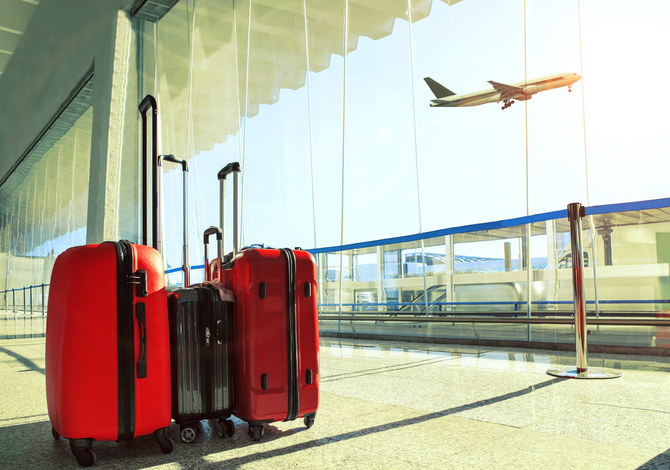
RIYADH: Customer service offerings at 16 Saudi airports have been recognized with a prestigious global award.
The Airports Council International’s Customer Experience Accreditation for 2024 has recognized facilities operated by the Kingdom’s Cluster2 Airports Co., which include Abha International Airport, Al-Jouf Airport, and Al-Qurayyat Airport.
Additionally, they consist of Bisha Airport, Dawadmi Airport, and Hail International Airport, as well as King Abdullah bin Abdulaziz Airport, King Saud bin Abdulaziz Airport, and Najran Airport.
“This accomplishment is not merely a testament to the quality and efficiency that we deliver; it also underscores our persistent dedication to enhancing the journey of each customer who passes through our gates,” the company said in an X post.
The ACEA program assists airports in enhancing customer experience management by guiding them through a comprehensive review and training process, which emphasizes stakeholder and employee engagement, as well as staff development, according to its website.
Other airports to receive this accreditation include Prince Abdul Mohsen bin Abdulaziz International Airport, Prince Nayef bin Abdulaziz Airport, and Rafha Airport.
Moreover, they include Sharurah Airport, Taif International Airport, Turaif Airport, and Wadi Al-Dawasir Airport.
The achievement of these airbases is a testament to the robust support and consistent oversight provided by the General Authority of Civil Aviation and the company, the Saudi Press Agency reported.
These airports have been acknowledged by ACI for their ongoing commitment to delivering exceptional services for travelers.
Ali Masrahi, CEO of Cluster2 Airports Co., expressed his satisfaction with this achievement, emphasizing the company’s focus on three key areas: understanding customer needs, strategic planning tailored to traveler requirements, and continuous improvement through monitoring key performance indicators across all aspects of the passenger.
Masrahi emphasized his company’s dedication to excellence and improving the airport travel experience.
The company added in its post that three of its airports received the same accreditation in 2023: “Today, we are proud to witness this number grow to encompass more of our airports, marking a remarkable achievement that underscores the progress and development we aim to accomplish.”
The firm further explained that obtaining accreditations from the ACI is the outcome of the team’s persistent efforts and unwavering dedication to ensuring an unforgettable travel experience.
ACI’s first Asia-Pacific and Middle East office was inaugurated in Riyadh in September 2023. Saudi Arabia’s Transport Minister and General Authority of Civil Aviation Chairman Saleh Al-Jasser, dignitaries and top officials from 49 countries attended the event.
ACI is an organization of airport authorities that aims to unite industry practices for airport standards by working with governments, regional members, experts, and international groups.
Accor to build 45 new hotels in Saudi Arabia by 2030: CEO
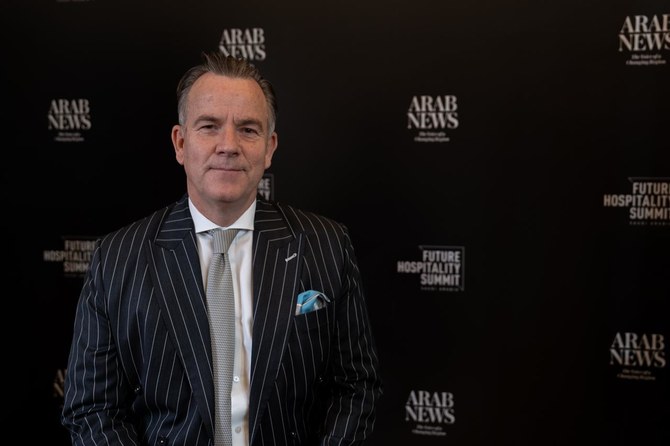
RIYADH: French multinational hospitality company Accor is set to expand its hotel portfolio in Saudi Arabia with 45 new establishments by 2030, as revealed by the regional CEO.
In an interview with Arab News, Duncan O’Rourke underscored the company’s dedication to the Kingdom’s vibrant hospitality sector and its aspirations embodied by Vision 2030.
O’Rourke said: “Saudi is an extremely important theater for us to play also because of what is happening, we are very proud to be part of this journey, this vision of 2030.”
Reflecting on the firm’s substantial presence in Saudi Arabia, O’Rourke highlighted: “Right now, we have 41 hotels in the Kingdom, and we plan to have another 45 hotels and an additional 9,800 rooms by 2030.”
Commenting on Accor’s participation in the Future Hospitality Summit, the CEO said that it aims to actively share its expertise, learn from industry peers, and collaborate on initiatives that will shape the future of the hospitality sector.
With a historical foothold in the Kingdom, the CEO reminisced: “Accor has a very long history in Saudi, a very established history.”
He added: “We are very excited to be here, me personally, having lived here 22 years ago and see the growth and the challenges.”
O’Rourke added: “One of the things we noticed tremendously was talent, and getting people to work in the hotels. Opening the hotels is one thing, but we need the local talent as well.”
He highlighted Accor’s partnership with the Ministry of Tourism and Education to nurture Saudi talent for the hospitality industry, saying: “We signed a partnership, which we were really excited about with the Minister of Tourism and Education, so we signed that partnership to be able to educate on all different levels, local people, to work in the hotels as well.”
In line with Accor’s commitment to nurturing local talent, O’Rourke explained that the firm’s academies are based worldwide and driven out of Paris, saying: “It’s been very famous how we’ve done that and trained and coached, but we felt that here with this tremendous growth in the speed of that growth and the fact that we really wanted to get local talent working.”
Diving more into the “Tamayyaz by Accor” program, the CEO explained that the educational process goes from an entry-level to a more senior position.
Accor and the Ministry of Tourism in Saudi Arabia have signed this partnership, which is dedicated to nurturing and developing Saudi talent in the hospitality industry.
O’Rourke told Arab News that they’re starting with a modest number of around 250 trainees, but that’s “quickly going to go up to over 3,000 continuously going through the process there, and so every process, 3,000 more going through.”
Expanding beyond major urban centers, O’Rourke emphasized “it’s not just in Riyadh, or in Jeddah, but in the secondary and third cities as well,” signaling Accor’s commitment to broadening its footprint across the Kingdom.
In a discussion about Accor’s varied brand lineup, he explained: “We split our luxury lifestyle, so we’re one of the largest luxury players in the market, the largest lifestyle player in the market, and then we have that premium midscale economy.”
Accor is the largest hospitality operator in the Holy Cities, with 13 hotels encompassing 11,900 rooms and a pipeline of six hotels with 1,700 rooms.
The firm has significantly contributed to developing the holy destination of Makkah, providing high-quality hospitality with direct access to the Haram.
Accor currently operates 13 brands and more than 16,000 rooms in Saudi Arabia, ranging from premium to economy segments, including luxury brands and Ennismore’s lifestyle collective. With leading names like Novotel, Swissotel, and Pullman, it’s a top hospitality provider offering diverse services and experiences.
He added: “We go with all those brands there in those resorts, not in just major cities, with Banyan Tree, Sofitel, and then, of course, Fairmont Raffles and the rest of the traditional brands as well.”
O’Rourke highlighted the necessity of employing locals, saying: “At the Novotel hotel, which we opened tonight, that’s the first female GM (general manager) in Saudi and so we are very proud of this diversification and giving opportunities to everybody there.”
The CEO added: “Being able to be part of this growth industry in terms of opening hotels, but also in educating and watching talent grow and one day moving from Saudi out and using that talent abroad, is also very exciting.”
In terms of partnerships, O’Rourke emphasized Accor’s strategic approach to collaborations that benefit both parties and local communities.
“In any partnership which we do with our core, we want somebody that embraces our values. We call them partners, we want to synergize with partners and then grow where it makes benefit for them, for us and the communities as well,” he said.
Reflecting on market trends, O’Rourke said: “Where we see the secondary cities the most traction we are in that sense there is coming from the mid-scale and the premium midscale economy,” highlighting the burgeoning demand in these segments.
“Where we do see a difference and more and more coming through is that leisure markets both locally, so Saudis traveling in Saudi, but also from the GCC coming through there,” the CEO added acknowledging the rise of leisure travel.
As Saudi Arabia continues its remarkable growth trajectory, O’Rourke expressed optimism, asserting: “We stay focused on our footprint. We have a very aggressive expansion plan to go from 44 to another 40 by 2030 is already aggressive.”
He concluded Accor’s commitment to delivering on its expansion goals while fostering talent development in the Kingdom, saying: “We continue to drive forward and make sure that we are not only opening hotels with the right brand, right partners, but then being able to really deliver on what we promised.”
Saudi banks’ funding profile changing on rising mortgage demand: S&P Global

RIYADH: Saudi banks are expected to pursue alternative funding strategies to deal with the rapid expansion in lending, fueled by the demand for new mortgages, according to S&P Global.
In its latest report, the credit-rating agency stated that the funding profiles of financial institutions in the Kingdom are set to undergo changes, primarily driven by a state-backed initiative to boost home ownership.
According to the analysis, mortgage financing represented 23.5 percent of Saudi banks’ total credit allocation at the end of 2023, compared to 12.8 percent in 2019.
“The ongoing financing needs of the Vision 2030 economic initiative and relatively sluggish deposits growth, is likely to incentivize banks to seek alternative sources of funding, including external funding,” said S&P Global.
The report also predicted that this pursuit of external funding could potentially impact the credit quality of Saudi Arabia’s banking sector.
According to the US-based rating agency, lending growth among Saudi banks has outpaced deposits, with the loan-to-deposit ratio exceeding 100 percent in 2022, up from 86 percent at the end of 2019.
S&P Global expects this trend to persist, particularly with corporate lending playing a more significant role in growth over the next few years. “We consider Saudi banks are likely to turn to alternative funding strategies to fund that expansion,” the report said.
It added: “We consider, however, that the risk created by the maturity mismatch is mitigated by the relative stability of Saudi deposits.”
The agency also predicted that Saudi banks’ foreign liabilities will continue to increase, rising from about $19.2 billion at the end of 2023 to meet the funding requirements of strong lending growth, particularly amidst lower deposit expansion.
The report highlighted that Saudi banks have already tapped international capital markets, and the credit rating agency expects this trend to continue for the next three to five years.
According to S&P Global, the Saudi banking system could transition from a net external asset position of SR42.9 billion, or 1.6 percent of lending, at the end of 2023 to a net external debt position within a few years.
In April, S&P Global, in another report, stated that banks in the Kingdom are anticipated to experience robust credit growth ranging between 8 to 9 percent in 2024.
The agency noted that this credit expansion will be propelled by corporate lending, fueled by increased economic activities driven by the Vision 2030 program.
Moreover, the report added that the Saudi government and its related entities are expected to inject deposits into the banking system, thereby supporting the credit growth of financial institutions in the Kingdom.
PIF’s tourism investment arm Asfar to develop the city of Hail as next destination, CEO reveals
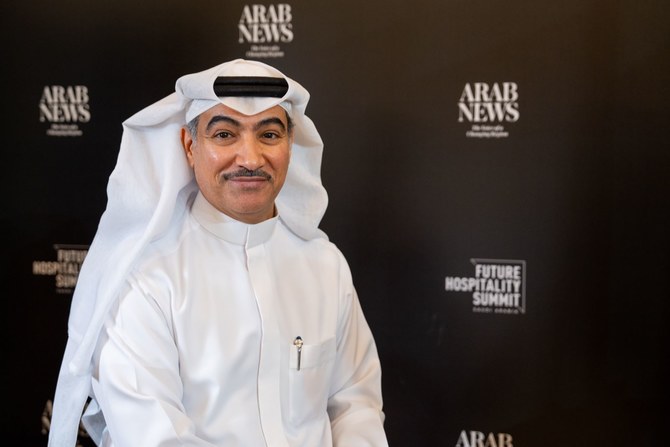
RIYADH: Saudi Arabia’s northwestern city of Hail will be the fifth destination development of Saudi Tourism Investment Co., the firm’s CEO has revealed.
Speaking to Arab News on the sidelines of the Future Hospitality Summit, Fahad bin Mushayt announced the plan, which comes after the activation of the company’s projects in Al-Baha, Yanbu, Al-Ahsa, and Taif.
The projects have all been launched within one year of the Public Investment Fund-owned firm – also known as Asfar – being unveiled.
The company is mandated to invest in new projects and develop attractive travel destinations, incorporating hospitality, tourist attractions, retail, and food and beverage offerings in cities across Saudi Arabia.
Bin Mushayt said: “In almost one year, Asfar is already playing in four destinations, with Hail coming soon, so I can reveal that.”
The entity is working to bridge the gap between the public and the private sector, as well as the local community, to create unique experiences that abide by the DNA of both the nation and the cities themselves, the executive noted.
This notion came to life during the summit, where the company signed a number of agreements with hospitality developers to launch four asset classes in the city of Yanbu.
Among them, Asfar announced the signing of investment agreements with Baheej, a joint venture between the company and the Tamimi-AWN alliance, as well as the Royal Commission for Yanbu.
“This morning, we announced our partnership with Curtain Hospitality, and they are going to be the operator of our resort in Yanbu, under the brand called Cloud 7. So the structure usually involves us and the developer as an investor, and they bring the know-how to build real estate and hospitality,” he said during the second day of the event.
The concept of Yanbu as Saudi Arabia’s most up-and-coming “second-tier city” was not limited to Asfar’s CEO alone.
Speaking on a panel at the summit alongside Mushayt, Abdulrahman Al-Bassam, a board member of Baheej, further emphasized these ideas, stating: “Yanbu is going to be the gateway of the new Red Sea Riviera, with four different asset classes expected to be operational by 2027.”
Adhering to its mandate, Asfar selects a different private sector partner to develop each of their destinations, the CEO explained, saying: “We are here to empower the private sector, to encourage them, to encourage them to go and invest with us. And we give them a lot of incentives.”
He acknowledged that those companies put their money into the subsidiary. However, Mushayt emphasized that they provide “a lot of incentives” as a semi-government entity empowered by PIF, the Ministry of Tourism, and the Ministry of Investment.
The PIF subsidiary utilizes a mix of domestic and foreign investments to empower its initiatives, focusing on operators that are suitable for the needs of the project, Mushayt said.
“The operator, if it’s a hotel operator, we bring a hotel operator; if it’s an adventure park operator, we bring a theme park. In fact, we have a theme park now, and we’re talking to international operators,” he said.
The Asfar CEO further revealed that they have a resort in Yanbu that would require cruises, “so we’re talking to Cruise Saudi, and we’re talking to another international player.”
He added: “It’s a mix of foreign and local operators, investors, and our hospitality management companies.”
HR development fund helps another 74k Saudis get private sector jobs, figures show

RIYADH: Almost 74,000 Saudi nationals received help securing private sector jobs in the first quarter of 2024 by the Kingdom’s Human Resources Development Fund.
The body supported the hiring of 73,878 citizens over the period, as offering advising, training, and empowerment services to more than 1.1 million individuals.
Additionally, during the same period, the organization provided services to more than 72,000 private sector firms across various industries throughout the Kingdom. Approximately 88 percent of these establishments were small and medium-sized businesses.
In the first quarter, a total of SR2.13 billion ($567.9 million) was allocated to support programs.
The fund, also known as HADAF, is dedicated to enhancing the skills of Saudi citizens, increasing their participation in the labor market, and encouraging private sector involvement in nationalization efforts, the Saudi Press Agency reported.
It also aims to strengthen partnerships with relevant organizations for training and employment, thereby increasing competitiveness and sustainability in the labor market. This contributes to achieving the goals of Saudi Vision 2030 regarding human resources development and labor market strategy.
The fund’s strategy, launched in the first quarter of last year, has contributed to enhancing the benefits for individuals and establishments from its programs and services.
It aims to achieve three key objectives: enhancing the development of national human capital to meet the evolving demands of the labor market, improving the relationship between supply and demand in the labor market, and enabling sustainable employment in the private sector.
In February, Saudi Arabia’s private sector labor market reached a workforce of 2.4 million citizens, with female participation increasing to 36 percent, according to an official.
Speaking at the third edition of the Qassim Youth Empowerment Forum, held in February, Deputy Minister of Human Resources and Social Development for Labor Affairs Ahmed Al-Zahrani stated that the increase observed over the past six years is unprecedented in any labor market worldwide.
Addressing the audience at the event, Governor of Qassim Prince Faisal bin Mishaal highlighted that the region’s workforce comprises 38,000 male employees and 26,000 female workers, illustrating a substantial presence of both genders in various roles within the private sector.
He added that this reflected the significant increase in job opportunities and the keenness to empower Saudi citizens in all divisions, underscoring the substantial support provided by the leadership in securing job opportunities for citizens and enhancing economic prospects.


